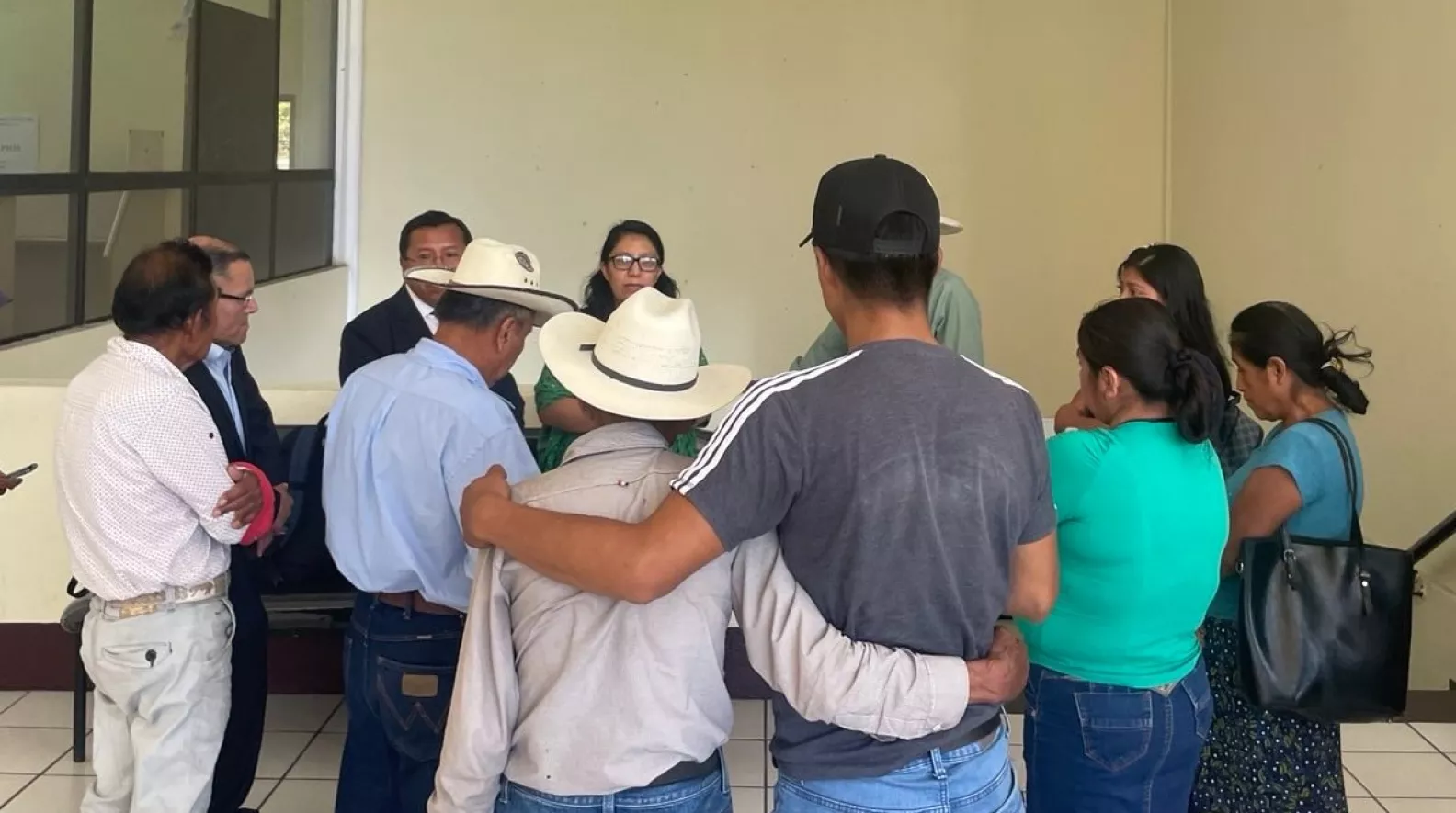in the municipality of Olopa, department of Chiquimula.

The Ch’orti’ Maya Indigenous Council of Olopa is an ancestral organization that defends the Ch’orti’ land and territory from extractive economic activities. It claims the indigenous and collective rights of the Maya Ch’orti’ people and works to protect these.
In 2012, the government of Otto Pérez Molina, through the Ministry of Energy and Mines (MEM), granted the company American Minerals S.A. an exploitation license for the extraction of antimony for 25 years in the Los Manantiales Quarry. The land to implement this extractive project is located in the village of El Carrizal, which belongs to the municipality of Olopa, and covers an area of two square kilometers. The license was granted without free, prior and informed consultation with the communities, as required by ILO Convention 169. Despite this, the company began operations in 2016.
This mining activity has had several negative impacts on the communities, such as increased inequalities, disputes and limiting access to land and other rights, in addition to the violation of the rights of indigenous peoples. For these reasons, the communities began their peaceful resistance to express their rejection of the mine and to achieve its definitive closure. This struggle has been met with attacks of various kinds. In January 2016, 22 of their leaders began to experience criminalization. They were charged with crimes of injury caused during a quarrel, raids, threats and aggravated arson. And although the criminal prosecution ended two months after the indictment, for reasons of public interest, the security incidents did not cease. On the contrary, they continued with renewed force throughout 2018, in the form of surveillance, intimidation and threats.
On September 30, 2021, at 10 a.m., indigenous authorities María Méndez, Bernardino Pérez and Juan Agustín, as well as human rights defender Santos Gerónimo Ramos Méndez and human rights defender Rosa Margarita Pérez Canán, were summoned to testify before the judicial body in the municipal capital of Chiquimula. Upon appearing before the judge, it was revealed to them that they had been summoned under the false premise that they were to testify in a different case and they were informed of an arrest warrant issued against them by a judge of First Criminal Instance of that department. They were then arrested but were not informed of the reasons for their arrest. Later that same day, they were charged with the crime of illegal detention, as decided by the First Instance Court of Chiquimula in a first declaration hearing. During that hearing the court ordered for them to be placed under house arrest and remain there during the three months permitted to carry out investigations by the Public Prosecutor’s Office (MP). Although the MP accused them of illegal detentions and aggravated robbery, the judge only accepted the charge of illegal detentions. In addition to these five people, the Maya Ch’orti’ Indigenous Council of Olopa found out that the judicial complaint had been brought against 34 other people from the communities, 12 of whom had arrest warrants.
The indigenous authorities denounced the way in which Rosa María Pérez was separated from her two daughters, who were still breastfeeding. The minors were taken, unaccompanied, in a PNC patrol car to the municipality of Esquipulas and later to the 23rd police station in Olopa. In the afternoon they were handed over to family members who arrived at the police station accompanied by indigenous authorities.
This criminal proceeding began on July 1, 2019, when Odilio de Jesús Guzmán Salazar, owner of the land where the mining company is located and husband of Guillermina Landaverri, owner of the mine’s operating license, and his son Rony Leonardo Guzmán Guzmán Guzmán broke a chain that the communities had placed at the entrance gate as a measure of resistance to the mining company’s operations. A motorcycle was also destroyed and security personnel shot at people from the peaceful resistance and physically assaulted Irma Pacay, an indigenous authority from the La Prensa community. In addition, Odilio de Jesús Guzmán Salazar and his son filed a complaint for illegal detentions.
On January 9, 2022, the indigenous authority Felipe Díaz Ramos was detained under the same judicial complaint, for the crime of illegal detention. The other charges brought against him were dismissed for lack of merit. The Court indicted Felipe and granted him house arrest without bail. This arrest is added to those of the five community leaders arrested in 2021, resulting in a total of six human rights defenders who, as of today, are still under house arrest, cannot leave Chiquimula and have to go to sign the register every month. The trial is scheduled to begin in April 2024.
Three other leaders and a community leader who were included in the initial complaint in 2019, Juan Carlos Pérez Canán, Leonor Crisóstomo Méndez, Guillermo Ramírez Pérez and Fredy Geovany Ramírez Ramírez, voluntarily presented themselves in court. On March 22, 2023, the Judge of First Criminal Instance of Chiquimula dismissed their case. They were accused of the crime of illegal detention. On April 17, the Public Prosecutor’s Office appealed the decision and the Mixed Court of Appeals of that department revoked the dismissal so that the four people would be sent to oral and public trial. In May 2023, the defense filed an appeal for annulment before the Criminal Chamber of the Judiciary (OJ) against the revocation of the dismissal of the criminal proceedings, which was subsequently denied. On April 12, 2024, the trial for these four individuals was opened. At the request of the defense, carried out by the legal team of the Center for Legal Action on Human Rights (CALDH), the two proceedings were consolidated and were scheduled to begin in July 2024. However, due to the overloaded schedule of the judge in charge of the trial, the start date was rescheduled for July 31, 2025.
The oral and public debate lasted until December 4, when Judge Silvia Lorena Solares Morales, of the Criminal Sentencing Court of Chiquimula, determined that the Public Prosecutor’s Office did not prove the crime of illegal detention, by not presenting objective or sufficient evidence to sustain the accusation. For this reason, it acquitted the 10 accused defenders. In its ruling, it recognized the right of the Ch’orti’ communities to demonstrate to defend their territory, against the mining activities of the Cantera Los Manantiales company, which were not consulted with the Ch’orti’ population, as established in ILO Convention 169.
